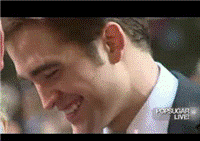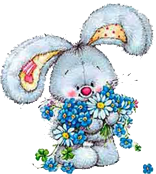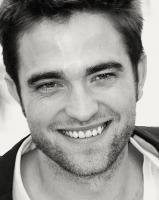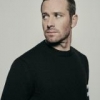He’s here in a central London hotel room, munching through a packet of dried mango pieces and looking every inch the handsome hunk. On the subject of his looks, he says: “Actually, this may sound stupid, but I don’t find it at all difficult to not be handsome.” But for now it’s all sharp facial definition, smooth skin and a crew cut (for a new movie with Juliette Binoche, set in space). He’s wearing black jeans and a leather jacket, and the only curious thing about his appearance is a vein on his forehead that bulges alarmingly every time he laughs.
And, boy, does he laugh. Robert Pattinson, multimillionaire (his personal Twilight haul is estimated at £65 million) and twice named one of the “Sexiest Men Alive” by People magazine, is a laugher. Infectiously so, in fact. Every subject, it transpires, is worth a good giggle. On his extreme weight-loss diet for Good Times, for example, he says with a chuckle: “Only eat canned tuna. And put incredibly hot sauce on everything else. It forces you to eat slowly and you don’t finish any meals, ever. It ruins your whole day. Ahahaha.” On discussing his relationship status, single or dating? “Yeah. No. Not really. Kind of. Yeah. Ahahaha.” And, on being critically derided for his less than Oscar-worthy work as swoonsome Twilight hero Edward Cullen? “The only reason it got judged was because it became so omnipresent. I did it five times. And if you do anything five times eventually people will say that your performance is shit.” More laughter.
Now the focus is on Good Time and the depths to which Pattinson dived to create Connie Nikas. In the movie, written and directed by the brothers Benny and Josh Safdie, Connie robs a bank, is pursued by the cops, breaks into a hospital, seduces a teenage girl, befriends a drug dealer and beats a luckless security guard (Barkhad Abdi from Captain Phillips) to a bloody pulp. In all this helter-skelter mayhem (the sheer pace is mesmerising) Pattinson remains profoundly charismatic and entirely credible — the result of the weight loss, the grim physical appearance, the pitch-perfect Queens accent and two months’ deep cover in a Harlem basement flat before and during shooting, living as Connie. “I had been there for about two or three weeks when I decided to go out as Connie,” he says. “It was the day where we did the pockmarks and the greasy look and the dirty jacket. And when I left the apartment I was suddenly approached by all these drug dealers, who appeared out of nowhere. And it was such a shock, because I realised, ‘Oh. Wow. Something has happened. And it’s in my face.’ ”
Pattinson, modest to a fault, has made some interesting and admirable movies since Twilight (David Cronenberg’s Cosmopolis, Anton Corbijn’s Life), but nothing like Good Time. In the past he has claimed that the global success of Twilight made him feel, as an actor, like a fraud, and today he deflects all praise for Good Time on to the Safdie brothers. “They talk to each other on set, they talk over each other, they create a lot of manic energy, and it does something to you, like [shakes in chair, as if getting electric shock] eeewwwwwww!”
He’s much more comfortable, however, talking about dog masturbation. Oh yes, the film features a scene where Connie lies with a drug dealer’s dog. Connie is something of a dog whisperer and so the film-makers placed, and filmed, a fake erection on the canine, to signify his “primal comfort” (their words) with Connie. The scene, however, was cut, although Pattinson mentioned it while on Jimmy Kimmel’s US chat show in August, adding that it had been suggested, for extra intimacy, that he masturbate the dog. Cue the internet firestorm, followed by a protest statement from the animal rights organisation Peta, praising Pattinson for “refusing to masturbate a dog”. Naturally, Pattinson laughs. “It’s still my favourite thing in the world,” he says. “There was a page on [the celebrity website] TMZ saying, ‘Robert Pattinson in Dog Sex Scandal’ with this picture of a dog next to it. I really wanted to print it out and get it framed. It was maybe my proudest achievement.”
We talk some more about Connie and he admits, almost reluctantly, that this is different from his previous roles. And that before he started Good Time he wanted “to do something where I was just flooring the accelerator”. I wonder if everything he does will for years be seen against the glare of Twilight. He defends those five films and notes that the first instalment was reviewed quite positively (he was deemed a “capable” actor by The New York Times).
The phenomenon around it, however, was different. He calls it “this massive life thing that I had to deal with”. He’s referring, of course, to overnight megastardom. To being fetishised as an unattainable love object for teenage girls and middle-aged women to such a degree that someone (a middle-aged American woman) would legally marry his cardboard cutout in a Las Vegas wedding ceremony.
He’s also referring to being hounded on the street by screaming girls so aggressively that even five burly bouncers have trouble keeping them away — the YouTube video “Robert Pattinson Attacked by Girls in New York” is instructive. And he’s referring, inevitably, to the five years (from 2008) during which everything was scrutinised. That included his relationship with his co-star Kristen Stewart, to which neither party admitted until Stewart apologised to Pattinson for their break-up in a 2013 public statement. In that time his every word was examined and overinflated (Time magazine declared him one of 2010’s “most influential people in the world”) in a way that might have driven most mere mortals off the rails.
“In retrospect, it was all positive,” he says. “In fact, it was positive at the time, just something to deal with. And yes, there were elements of it being stressful, but even the stressful bits were part of a completely unique life experience. Then again, I dunno, maybe it’s all driven me nuts, and I just haven’t realised it yet.” He laughs and says that he dealt with the crowds of Twihards by turning inwards, like a stripper. “I always think that strippers are never actually naked, even when they’re naked,” he says. “And there’s an element of that when you get into a crowd it becomes a defensive thing, because your mind’s not really there.” He adds that the screaming fans thing happens less today. “It’s completely random and I’ve gotten better at dealing with it. Instead of going straight into panic mode I can calm myself down. I still go into panic mode about 75 per cent of the time.”
Before Twilight there was the usual. School plays in suburban London (he grew up in Barnes), and no suggestion from the career of his father, a vintage car importer, or mother, a model booker, that destiny as a big-name actor awaited. There was a brief period as a model, when he was 12. A glamorous neighbouring mum on his paper round suggested the gig. He “kind of fancied her, but she was slightly out of my reach”. He joined an agency but didn’t win a single job. An am-dram production of Tess of the d’Urbervilles led to a talent agent, and a small role in Reese Witherspoon’s Vanity Fair. His scenes were cut, but a sympathetic casting director, on spotting him, red-faced with shame, at the Vanity Fair premiere, offered Pattinson an audition for Cedric Diggory in Harry Potter and the Goblet of Fire instead. He took it, he got it, he bounced from Potter to Twilight and the rest . . .
He lives between Los Angeles and London. He laughs raucously at the very idea that we’re going to discuss his private life, and how he appears to have been engaged to the singer FKA Twigs but is now engaged no more. “No, it’s better if I never talk about that stuff,” he says. He will admit, however, to having a serious relationship with his 17 guitars. “I play a lot. In hotel rooms mostly.” He also admits that his personal wealth makes the idea of needing to do a lucrative blockbuster mostly redundant. “I’m lucky that I don’t have a mortgage to pay, or anything like that,” he says. “And my previous experience on big movies, where I wasn’t confident enough to say, ‘No, this is how I want to do it,’ means that I’m a little gun-shy about doing something again that I know is mainstream.”
When not making movies he does undercover Twitter. “I love it. I look at people having arguments on Twitter and I think, ‘Do you really mean this?’ ” He retweets a lot. And his account name, clearly not @RobertPattinson, is the most heavily guarded secret in showbiz, apparently. To reveal it, he says, “would be one of my most embarrassing things. Like looking deep into my psyche. That would be worse than, like, nudes getting out there.”
He’s next up in Joanna Hogg’s two-part 1980s drama The Souvenir, and in the art-house space epic High Life, about convicts sent into deep space to investigate a black hole (“completely insane, completely crazy”).
I wonder if — thanks to Good Time and to, at last, credibility and to where he is now — does he feel happy? “Oh yes,” he says, quick as a flash. “I think so, yes.” Then he looks down at the empty packet on the table, squeezes it and says: “But it might also be because I’ve eaten a whole pack of mango.” And then, naturally, he laughs.
https://t.co/x0kMyCzUxu




 Тема закрыта
Тема закрыта






























